If you experience headaches on a frequent basis then please continue reading this article to learn correct TENS unit placement for tension headaches and how it can provide some relief for your pain.
Where to place TENS unit pads for a Headache
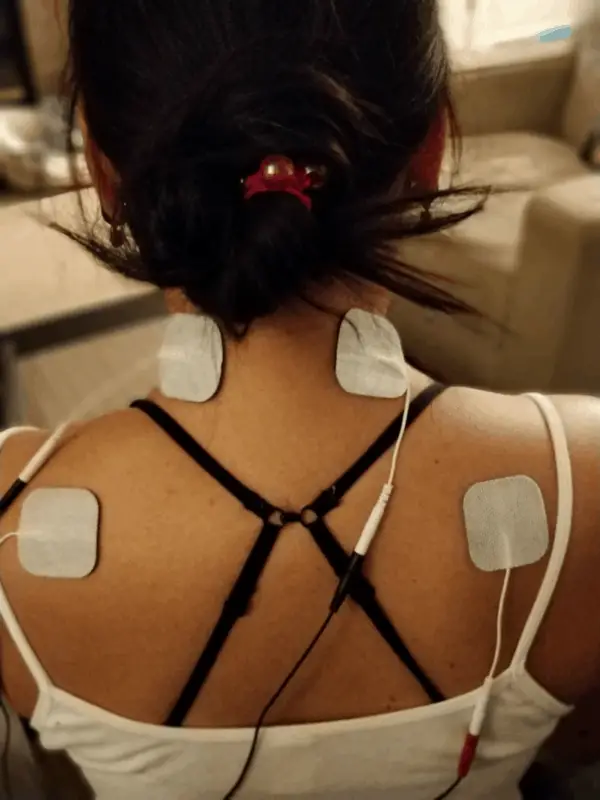
As you can see you want to place 2 electrode pads on the bottom portion of your neck and 2 electrode pads below the base of your neck where your shoulders meet. Make sure to place the pads on either side of your spine.
Note: DO NOT place a TENS pad directly on your spinal column.
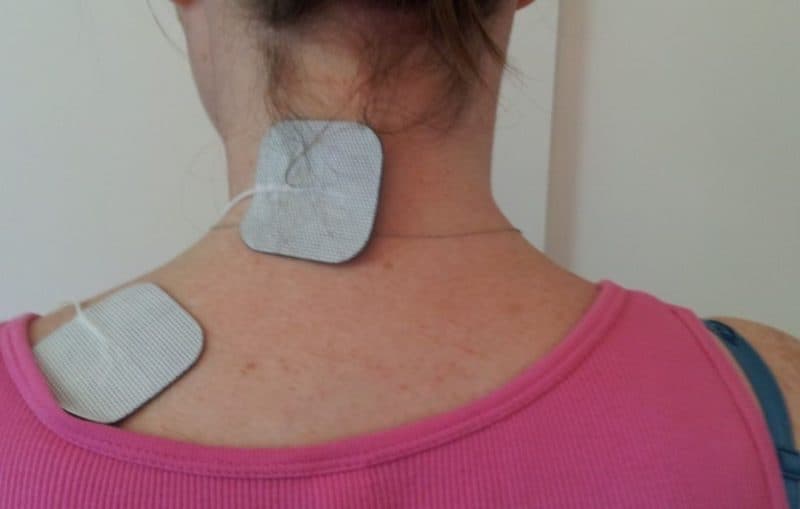
You can also try positioning the 1 pad on your neck and the other along the top part of the shoulder area. This could provide relief if you happen to suffer from chronic tension headaches.
Need To Upgrade Your TENS Unit?
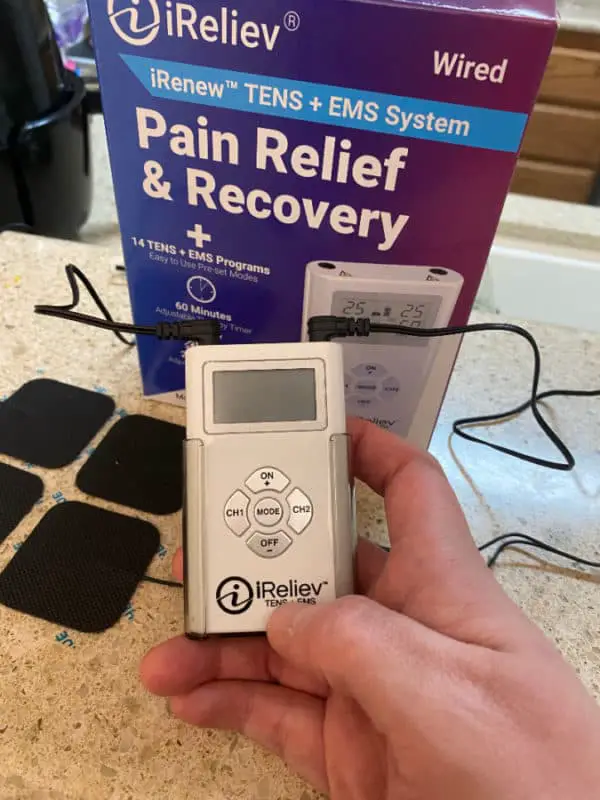
This is the exact TENS unit that I use. It is perfect for alleviating many common types of pain. The iReliev is a great little device and has a lot going for it. It is well under $80 and has several programs to choose from and is small enough to fit in your pocket.
You do not need to spend hundreds of dollars to get a quality TENS unit and iReliev gives you a ton of value for the price being paid. Best part is they are based in Dallas, Texas and have phenomenal customer service FREE shipping and delivery in less than 5 days.
Get yours today on the iReliev website by clicking here.
TENS Unit Settings
When using a TENS unit you have the option of choosing what level of intensity.
A good rule of thumb is to use an intensity level where you can feel the stimulation and it does not cause you pain or discomfort. If you feel any pain lower the setting. Also, if you feel the muscles “twitching” lower the intensity level.
Unsure on how high you should set your TENS Unit? Click here
Can you put a TENS unit on your temples?
Yes. You can place electrode pads on your temples or the sides of the head. for relief from tension headaches. Be careful and always start on the lowest setting on the TENS unit as the temples are very sensitive. If you start to feel any pain from the TENS unit lower the intensity.
Check out my TENS Placement Guide for how to place the TENS pad.

Why should you trust me?
I have extensively used TENS units for neck, shoulder, back and knee issues. I became familiar with TENS therapy through countless visits to my chiropractor and physical therapist’s office. I have spent many hours researching and reading how TENS therapy can alleviate pain.
I consider myself knowledgeable in the use of TENS units and have used them regularly to help manage pain over the years. Many of my recommendations are from firsthand experience/use and hopefully my information can be a benefit to you.
Can you use a TENS unit for headaches?
So one of the most common reasons to see a doctor is for a headache. Almost 90% of the general population at some point in time will have a headache. Some people regularly suffer from tension headaches.
Well, according to research done by the National Institutes of Health, a study was done to see if using a TENS therapy unit would help with tension headaches.
See the study here- https://www.ncbi.nlm.nih.gov/pubmed/19062467
The results were encouraging. They showed a significant reduction in pain and the study concluded the following:
“Based on the findings of this study, it was therefore concluded that TENS application should be considered in the long-term management of patients with CTTH (chronic tension type headache).”
Here is a more current study on the effectiveness of using a TENS unit to treat headaches:
https://www.ncbi.nlm.nih.gov/pmc/articles/PMC4222010/
Here are the results from this study:
“The results from the analysis of covariance showed that treatment with NFB and TENS had caused significant decrease in the frequency, severity, and duration of headache in experimental groups.”
So since there is some evidence pointing to the effectiveness of TENS therapy for headaches and tension headaches it is definitely worth exploring as a treatment.
As always, please consult your physician to see if TENS therapy is an option for you.
Other treatments for tension headaches
In addition to TENS therapy the use of a Acupressure mats and pillows have been found to relive tension headaches. Like this one from Amazon:
These are affordable, under $40 and are effective at helping reduce the pain of tension headaches.
The thousands of acupressure points work on the body, increasing blood flow and help promote healing. The Acupressure mat and pillow use tiny little sharp plastic acu-points to stimulate the body’s pressure points just like acupuncture.
What are Tension Headaches?
After sitting in front of my computer for eight hours, rushing to meet my deadlines before the end of the Friday work day, and knowing that I have to drive twelve hours to visit family members at a reunion this weekend, I feel as though my head is stuck inside a vice grip.
It doesn’t matter how much water I drink, or if I try to close my eyes and relax for ten minutes, the back of my neck, and my forehead can’t find relief from this pressing pain in my temples.
What I have is called a tension headache, which is also called an idiopathic headache, psychogenic headache, psychomyogenic headache, muscle contraction headache, ordinary headache, or more simply put, a stress headache.
In todays modern multitasking world, they aren’t only common, but rampart around the nation. Being the most common type of headache for adults in the United States, three quarters of the population have these types of headaches at some point during the year.
According to research from The Cleveland Clinic tension headaches impact about 3% of the US population and include headaches that can last as much as 2 weeks per month.
Women are twice as likely to suffer tension headaches as men.
It once was thought it was solely caused by emotions and the mind, but now is believed to occur because of neurobiological reasons. If the tension headaches only occur one to three times a month they are called infrequent headaches.
Having these stress headaches more than fifteen days out of the month is called episodic tension headaches, and experiencing them more than fifteen days turns into a chronic tension headache condition. If I experience these tension headaches more than fifteen days, I think it will be time to re-evaluate my job and my lifestyle.
What can cause them?
So what is it that causes these tension headaches?
In almost every situation, some form of stress causes these tension headaches. This could be mental stress, with chronically worrying about something or someone in life, or, it could be a physical stress in which the body is low on energy. The most common causes of tension headaches are:
- Anxiety
- Posture
- Emotional & Mental Stress
- Low Iron Levels
- Depression
- Not enough sleep
- Fatigue
- Low Iron
- Tight Muscles/ Bad Posture
- Excessive Alcohol
- Excessive Caffeine
- Teeth Grinding/ Dental Problems
In some cases dehydration may be to blame. Without proper water comes tight muscles and fatigue, and both of these are causes to consider when experiencing tension headaches.
What are the Symptoms of Tension Headaches?
Tension headaches are no fun, and the symptoms are considered more annoying then they are extremely painful. Paying attention to when they occur and what they effect can be helpful when trying preventing them.
Symptoms of tension headaches include:
- A dull pressure pain
- A feeling of squeezing or tightening around the head
- Tightness/ Tenderness in the shoulders, neck, and temples of the head
- Trouble Sleeping
- Worsening of symptoms due to added stress
Many times, tensions headaches can be mistaken for migraine headaches and vice versa. The main difference is tension headaches don’t interfere with physical mobility, while migraine headaches will progressively get worst with bright lights, and loud sounds. Too much physical exercise can also worsen migraine conditions.
Tension headaches usually do not cause severe pain or vomiting. If this is occurring, please seek medical attention!
How long can they it last?
Tension headaches vary on how long they can last. As mentioned previously, there are three different types of chronic headaches. They are infrequent, episodic and chronic.
Infrequent Tension Headaches
- One to three times a month
Episodic Tension Headaches
- Can last anywhere from 30 minutes to a week
- Occurs 15 days out of a month for a period for three months
Chronic Tension Headaches
- Continual headache
- More than 15 days a month and longer than three months
Can exercise or diet help lessen them?
Many of the symptoms of tension headaches are caused by poor lifestyle habits. Stressful jobs, poor diet, not enough sleep, and sedentary work environments all negatively contribute to produce these tension headaches.
The good news is, to relieve many cases of tension headaches; all it takes is a new routine and regime with an incorporated healthy diet and exercise. These can include:
- Eating regular balanced healthy meals
- Weightlifting
- Cardio (Running, Walking, Cycling)
- Quit Smoking
- Limit Alcohol and Caffeine Consumption
- Limit your Processed Food Intake
- Planned Daily Routines
Typical treatments for tension headaches
The most effective treatment for tension headaches is preventing them before they happen. It’s important to understand and work with feelings to better understand what it is that is causing them.
An effective way to monitor and understand feelings is to keep a tension headache journal.
Every time a tension headache comes on, I should write down what it was I was doing right before it happened.
After a couple of tension headache episodes, common circumstances and repetitive behaviors will begin to surface for me, in which will lead to being able to identity the cause/s of my tension headache.
By enacting stress relief techniques, tension headaches can not only prevented but also possibly eliminated. Some effective treatment could be:
- Yoga class
- Deep Breathing Exercises
- Listening to Guided Relaxation Tapes
- Listening to Relaxing Music
Besides that of Relaxation techniques, there are different types of therapy and training that can be utilized to help in the process of preventing tension headaches. They are:
- Cognitive Behavioral Therapy: This involves talking about and identifying stresses to minimize the occurrence and severity of tension headaches.
- Biofeedback Training: This will involve going to see a medical professional. In this technique an individual is connected to a device that will monitor blood pressure, heart rate, and body tension. By seeing how these are affected, an individual is able to learn how to control their tension and stress.
- Hypnotherapy: this is an alternative medicine that helps reprogram the mind to help cope with stress, both understood and hidden.
- Acupuncture: this is proven very effective for chronic tension headaches. There has been multiple studies done that provide evidence to support acupuncture as a nonpharmacologic method to treat episodic and chronic headaches.
- Massage: this is also an effective method to relieve tension headaches, due to relieving tight muscles in the shoulders, neck, and head. The increased circulation could relieve the build up of pressure in the head.
- Medicines are used, but only with infrequent headaches. In these cases NSAIDS and aspirin can be used. Caffeine can also prove effective for relieve, but it can also cause worsening symptoms of a tension headache after it wears off.
With tension headaches, the most effective means of relief is prevention.
The main cause of these headaches is stress, and by being able to pinpoint and remove the cause, symptoms will begin to cease and hopefully diminish in a short time period.
Proper exercise or active lifestyle, a healthy and balanced diet, and sleep, are all important factors when preventing tension headaches.
Alternative medicine such as massage and acupuncture are proven to help aid in the healing process, with no negative side effects.
The mind is a power thing, and hypnotherapy and biofeedback training can help bring attention to identifying stressors in your life, and help provide feedback on how to properly defend against them.
The truth is stress is a natural part of life, and the majority of us will all have stress headaches in our lifetime. The most important is to understand what it is, and how to properly take care and manage it.
Here are some tip on how to use a TENS device:
- Do not put the electrode pads on skin that is damaged, broken or irritated.
- Never place the electrode pads on the front or side of the neck where your carotid arteries are
- Never place close to your eyes
- Never use close to your mouth
- Never place the electrode pads over your heart
Some things to consider when placing the electrode pads on your skin:
- First wash the area of the skin where the pads will be placed. You can use a mild soap and water before applying electrodes, just make sure that you rinse the soap off and dry skin to remove any moisture.
- If the area for the electrode pads has hair you can use some scissors to remove excess hair. It is not necessary to shave the area where the pads will be placed. .
- Sometimes a skin problem can happen from the “pulling stress” from the sticky adhesive that the pads have. This can happen when the pads are overly stretched across the skin during use. To avoid this, apply the pads from center outward; do not stretch the pads over the skin.
- When it is time to the remove the pads, it is best to always remove by pulling in the direction of hair growth.
- A good rule to follow is to NEVER apply pads over broken or irritated skin. After removing you can put some skin lotion on the area where the pad was.
What are the benefits of using a TENS unit?
- Increased circulation
- Improvement of sleep
- Pain relief
- Minimize the use of pain relievers and or other prescribed medication to alleviate pain.
- Increased range of motion and function
- Inexpensive compared to continued use of OTC and prescribed pain medications
I truly hope that this article helps and you are able to find relief from tension headaches.
Thank you for reading
References:
https://www.webmd.com/migraines-headaches/tension-headaches#1
https://medlineplus.gov/ency/article/000797.htm
https://www.mayoclinic.org/diseases-conditions/tension-headache/symptoms-causes/syc-20353977
https://emedicine.medscape.com/article/792384-treatment
https://americanmigrainefoundation.org/understanding-migraine/tension-type-headache/


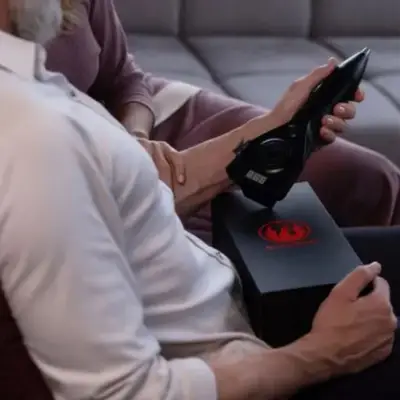

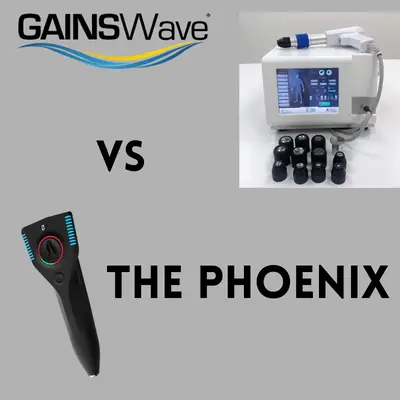
Leave a Reply
You must be logged in to post a comment.